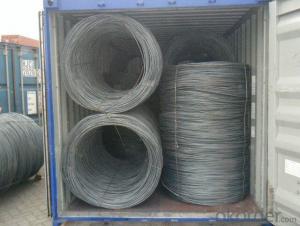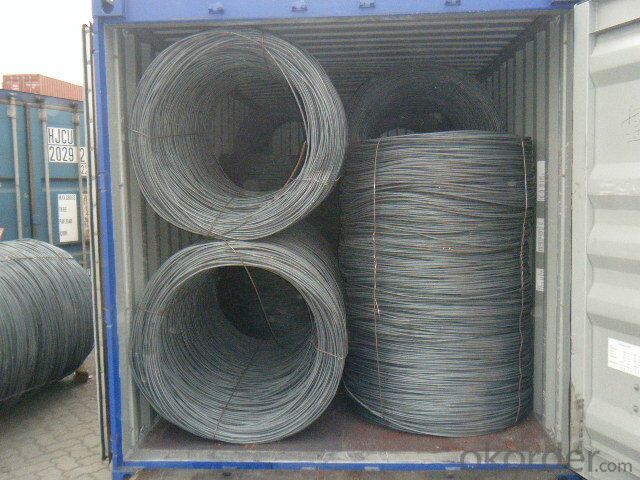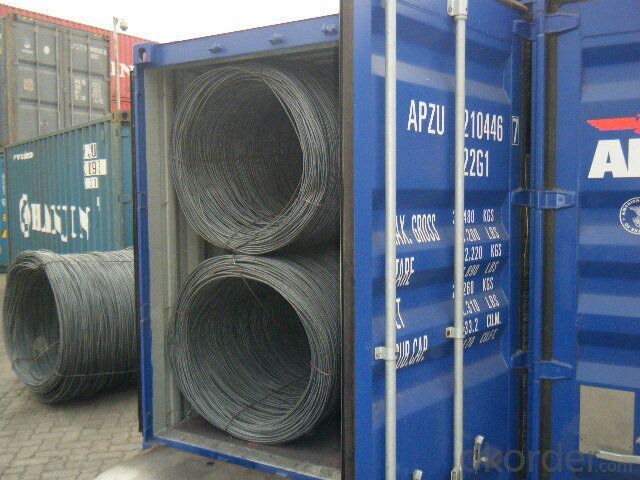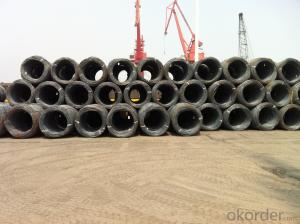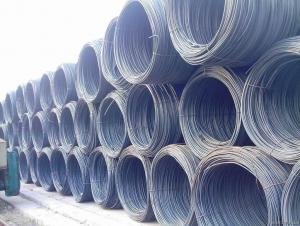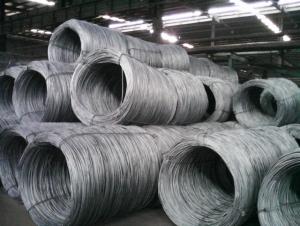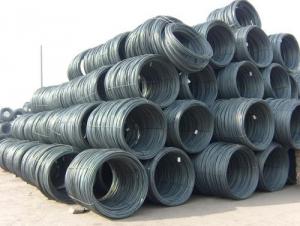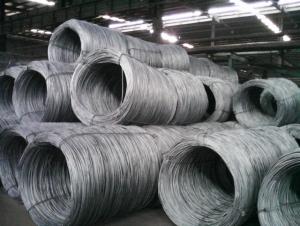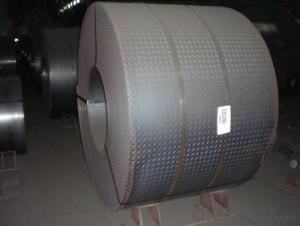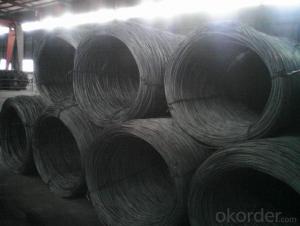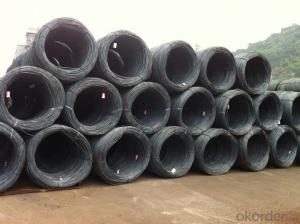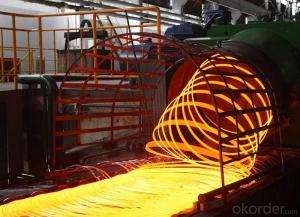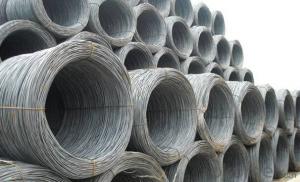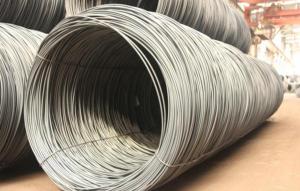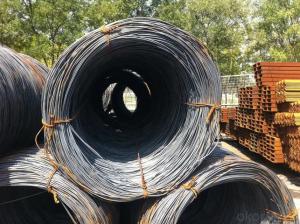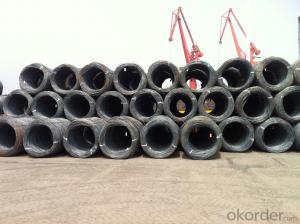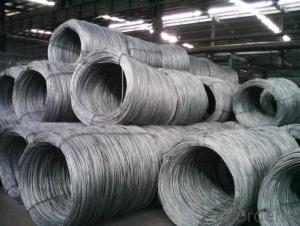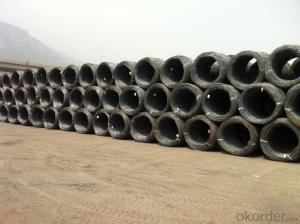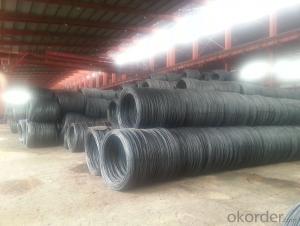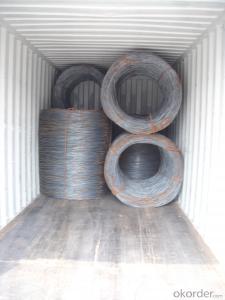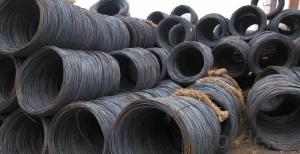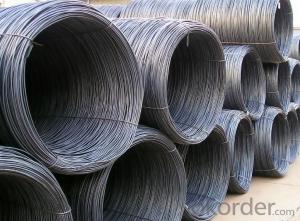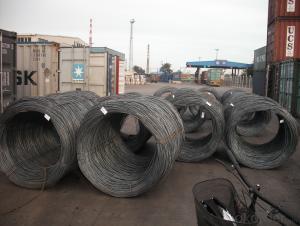Steel Rod SAE1008B Rod, High Quality Wire Rod
- Loading Port:
- Tianjin
- Payment Terms:
- TT OR LC
- Min Order Qty:
- 30 m.t.
- Supply Capability:
- 20000 m.t./month
OKorder Service Pledge
OKorder Financial Service
You Might Also Like
Specification
Product Description for Steel Rod SAE1008B Rod, High Quality Wire Rod:
OKorder is offering Steel Wire Rod Coils Steel Hot Rolled Wire Rod Q195 at great prices with worldwide shipping. Our supplier is a world-class manufacturer of steel, with our products utilized the world over. OKorder annually supplies products to European, North American and Asian markets. We provide quotations within 24 hours of receiving an inquiry and guarantee competitive prices.
Product Applications for Steel Rod SAE1008B Rod, High Quality Wire Rod:
Steel Wire Rod Coils Steel Hot Rolled Wire Rod Q195 are ideal for structural applications and are widely used in the construction of buildings and bridges, and the manufacturing, petrochemical, and transportation industries.
Product Advantages for Steel Rod SAE1008B Rod, High Quality Wire Rod:
OKorder's Steel Wire Rod Coils Steel Hot Rolled Wire Rod Q195 are durable, strong, and resist corrosion.
Main Product Features for Steel Rod SAE1008B Rod, High Quality Wire Rod:
· Premium quality
· Prompt delivery & seaworthy packing (30 days after receiving deposit)
· Corrosion resistance
· Can be recycled and reused
· Mill test certification
· Professional Service
· Competitive pricing
Specification for Steel Rod SAE1008B Rod, High Quality Wire Rod
Steel Grade: Q195/235, SAE1006-1018B
Standard: ASTM, GB
Diameter: 5.5mm, 6.5mm, 7mm,8mm,9mm,10mm,12mm,14mm
Type: in coil, coil weight around 2MT
Alloy or Not: Alloy
Technique: Hot Rolled
Place of Origin: China Mainland
Surface: round, no twisted, light and smooth
Chemical Composition for Steel Rod SAE1008B Rod, High Quality Wire Rod
Grade | Chemical Composition(%) | |||||
C | Mn | Si | S | P | B | |
SAE1006B | 0.03~O.07 | ≤0.32 | ≤0.30 | ≤0.045 | ≤0.040 | >0.0008 |
Mechanical properties | ||||||
Yield strength(N/mm2) | Tensile strength(N/mm2) | Elongation(%) | ||||
250-280 | 350-380 | ≥32 | ||||
Packaging and delivery for Steel Rod SAE1008B Rod, High Quality Wire Rod
Packaging Detail: products are packed in coil, each coil weight around 2 MT, and then shipped by container or bulk vessel
Delivery Detail: within 45 days after received deposit or LC.
Label: to be specified by customer, generally, each bundle has 1-2 labels
FAQ:
Q1: Why buy Materials & Equipment from OKorder.com?
A1: All products offered byOKorder.com are carefully selected from China's most reliable manufacturing enterprises. Through its ISO certifications, OKorder.com adheres to the highest standards and a commitment to supply chain safety and customer satisfaction.
Q2: How do we guarantee the quality of our products?
A2: We have established an advanced quality management system which conducts strict quality tests at every step, from raw materials to the final product. At the same time, we provide extensive follow-up service assurances as required.
Q3: How soon can we receive the product after purchase?
A3: Within three days of placing an order, we will begin production. The specific shipping date is dependent upon international and government factors, but is typically 7 to 10 workdays.
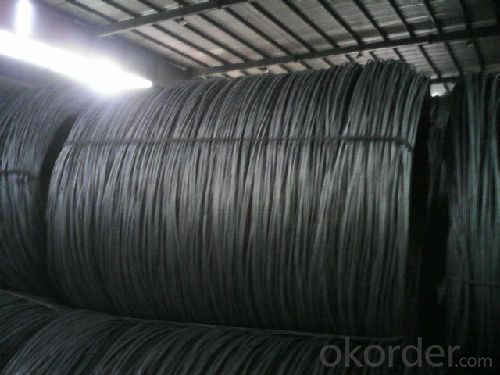
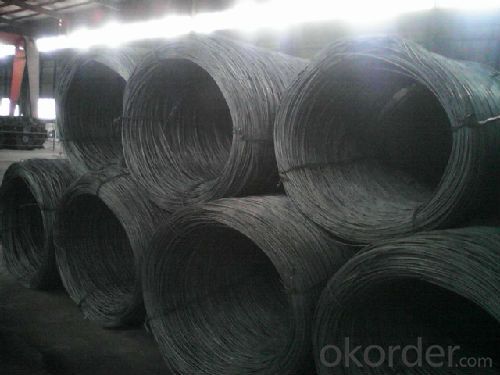
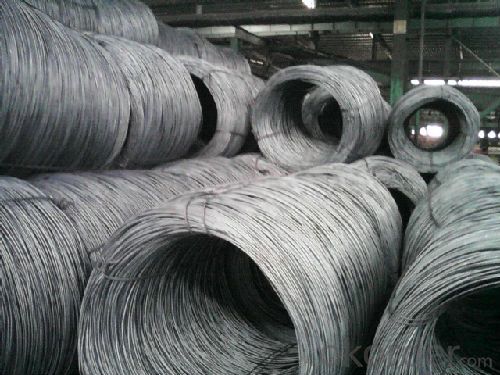
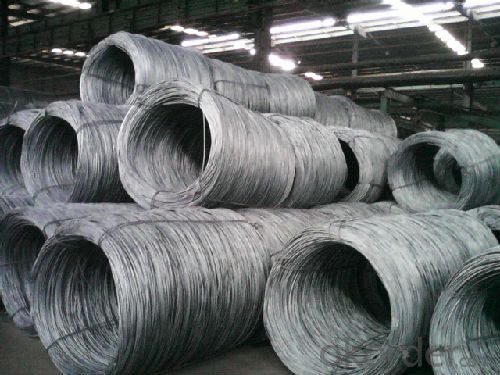
- Q: How is steel wire rod used in the aerospace industry?
- Steel wire rod is commonly used in the aerospace industry for various applications. It is primarily utilized for manufacturing aircraft cables, suspension components, and structural reinforcements. The high strength and durability of steel wire rod make it suitable for withstanding the extreme conditions and stresses that aircraft components are subjected to during flight.
- Q: How is steel wire rod straightened after the rolling process?
- After the rolling process, steel wire rod is typically not perfectly straight. To straighten it, there are several methods that can be employed. One common method is called the straightening process, which involves passing the wire rod through a series of straightening rolls or dies. The wire rod is fed into the first set of rolls, which are typically inclined at an angle. As the rod passes through these rolls, it is bent in the opposite direction of its initial curvature. The angle of the rolls is adjusted accordingly to gradually straighten the rod. This process is repeated through multiple sets of rolls, with each subsequent set adjusting the angle slightly to further straighten the wire rod. Another method used to straighten steel wire rod is the rotary straightening process. In this method, the wire rod is passed through a series of rotating straightening rolls. These rolls are often placed at different angles to effectively straighten the rod. As the rod passes through the rolls, it is subjected to bending forces that counteract its initial curvature, resulting in a straightened wire rod. In addition to these methods, there are specialized machines and equipment available for straightening steel wire rod. These machines use various mechanisms, such as hydraulic or mechanical systems, to apply controlled bending forces to the rod and straighten it. Overall, the straightening process for steel wire rod involves applying controlled bending forces through a series of rolls or specialized machines. This helps to gradually eliminate any curvature and achieve a straightened wire rod that meets the required specifications.
- Q: What are the common applications of high-strength steel wire rod?
- High-strength steel wire rods are commonly used in a variety of applications, including construction, automotive, aerospace, and manufacturing industries. They are often used for reinforcement in concrete structures, such as bridges and buildings, due to their superior strength and durability. In the automotive industry, high-strength steel wire rods are utilized for the production of suspension systems, seat frames, and safety components. They are also essential in the aerospace sector for manufacturing aircraft components and engines. Additionally, high-strength steel wire rods find applications in manufacturing processes, such as wire mesh, springs, and cables, due to their ability to withstand high stress and resist deformation.
- Q: What are the different types of steel wire rod surface defects and their prevention methods?
- During the manufacturing process, various defects may arise on the surface of steel wire rods. These defects encompass scratches, pits, scale, cracks, and surface irregularities. The presence of any of these defects can adversely impact the quality and performance of the wire rods. Therefore, understanding the causes and employing prevention methods is crucial. 1. Scratches: Improper handling or contact with abrasive materials can lead to scratches. To prevent this, it is essential to handle the wire rods delicately and avoid contact with rough surfaces. The use of protective coverings or pads during transportation and storage can also serve as a preventive measure against scratches. 2. Pits: Pits refer to small depressions or cavities on the surface of the wire rods. They can occur due to impurities in the raw materials or the manufacturing process itself. To prevent pits, it is imperative to utilize high-quality raw materials and maintain proper cleaning and maintenance of the manufacturing equipment. 3. Scale: Scale refers to the oxide layer that forms on the wire rod surface during manufacturing, resulting in a rough and uneven surface. To prevent scale formation, it is important to control the temperature and atmosphere during the manufacturing process. Regular cleaning and maintenance of the equipment also aid in preventing scale. 4. Cracks: Excessive stress or improper cooling during manufacturing can lead to cracks. To prevent cracks, it is crucial to regulate the cooling rate and ensure proper heat treatment of the wire rods. Using appropriate lubrication during wire drawing can also reduce stress and prevent cracks. 5. Surface irregularities: Surface irregularities include bumps, dents, or unevenness on the wire rod surface. These irregularities can arise due to mishandling or issues with the manufacturing equipment. To prevent such irregularities, one must handle the wire rods with care and maintain and calibrate the manufacturing equipment properly. In conclusion, the manufacturing process of steel wire rods can give rise to several surface defects. To prevent these defects, careful handling of the wire rods, utilization of high-quality raw materials, regular maintenance and cleaning of the manufacturing equipment, control of temperature and atmosphere, and proper heat treatment and lubrication are essential. Implementing these prevention methods can greatly enhance the quality and performance of the steel wire rods.
- Q: How is steel wire rod used in the production of wire mesh for agricultural applications?
- Steel wire rod is used in the production of wire mesh for agricultural applications by being transformed into thin wires that are then woven or welded to form the mesh. This mesh is used in various agricultural applications such as fencing, animal enclosures, crop support, and pest control. The strength and durability of the steel wire rod make the wire mesh suitable for withstanding harsh weather conditions and providing a robust barrier for agricultural purposes.
- Q: What are the typical applications of steel wire rod?
- Steel wire rod is a versatile material that finds its application in various industries. Some of the typical applications of steel wire rod include: 1. Construction: Steel wire rod is commonly used in construction applications such as reinforcing concrete structures. It provides strength and durability to the construction materials, making them more resistant to cracking and bending. 2. Manufacturing: Steel wire rod is extensively utilized in the manufacturing sector for producing a wide range of products. It is used in the production of nails, screws, springs, cables, ropes, wire mesh, and various other hardware and industrial products. 3. Automotive industry: Steel wire rod is widely used in the automotive industry for manufacturing components like suspension springs, seat springs, wire harnesses, and tire reinforcement. Its high strength and flexibility make it an ideal choice for these applications. 4. Electrical industry: Steel wire rod is used in the electrical industry for producing cables and wires. It provides excellent conductivity and durability, making it suitable for transmitting electric power or signals efficiently. 5. Agriculture: Steel wire rod is utilized in the agricultural sector for various purposes. It is used in fencing, trellis systems, and vineyard wires to provide support and protection to crops and livestock. It is also used in manufacturing agricultural equipment like wire fencing, gates, and animal enclosures. 6. Packaging and fastening: Steel wire rod is employed in the packaging industry for manufacturing wire for packaging purposes, such as baling wire for securing bundles or tying products together. It is also used in fastening applications like wire ties and clips. 7. Furniture and appliances: Steel wire rod is used in the production of furniture and appliances, such as wire shelves, racks, and frames. It provides strength and stability to these products, making them durable and long-lasting. Overall, steel wire rod has a wide range of applications due to its excellent strength, flexibility, and durability. Its versatility makes it an essential material in various industries, contributing to the development and improvement of numerous products and structures.
- Q: What are the different types of packaging options available for steel wire rod?
- The packaging options for steel wire rod vary, depending on factors such as size, weight, intended use, and buyer or manufacturer preferences. Coil packaging is a common option for smaller diameter wire rods. It involves coiling the wire rod into a circular shape and tightly securing it with plastic or steel straps. Coils are convenient for transportation and storage. Bundle packaging, on the other hand, is suitable for larger diameter wire rods. This method involves bundling multiple pieces of wire rod together and tightly binding them with steel straps. Bundles provide stability during transportation and handling. In addition to coils and bundles, steel wire rod can also be packaged in wooden crates or pallets. This method offers extra protection during transportation and is suitable for both small and large diameter wire rods. Wooden packaging is often preferred for long-distance shipping or extended storage. Furthermore, manufacturers may offer custom packaging options to meet specific requirements. This could involve using special wrapping materials, implementing additional protective measures, or creating unique packaging designs. Overall, the various packaging options available for steel wire rod ensure safe and efficient handling, transportation, and storage, while also catering to the specific needs of buyers and manufacturers.
- Q: What are the different types of steel wire rod surface defects and their repair methods?
- Steel wire rods can experience different types of surface defects, each necessitating a unique repair approach. Common defects include pits, scale, scratches, and cracks. Pits manifest as small cavities on the wire rod's surface, resulting from factors like corrosion or mishandling. To rectify pits, the affected area can be ground down and then polished to restore a smooth surface. Scale refers to the flaky residue that forms during the wire rod's manufacturing process. It can be eliminated through chemical agents or mechanical techniques such as brushing or blasting. Following scale removal, the wire rod can be coated with a protective layer to prevent future formation. Scratches are shallow grooves that can occur during handling or transportation. Minor scratches can be resolved by using abrasives or polishing compounds to buff them out. For deeper scratches, the affected area may need to be ground and then polished to match the surrounding surface. Cracks are more severe defects resulting from stress, improper cooling, or material flaws. Repairing cracks typically involves cutting out the affected section and subsequently welding or brazing it back together. In some cases, heat treatment may be necessary to restore the wire rod's strength and integrity. It's important to note that the repair methods mentioned may vary depending on the defect's severity and nature. It is always advisable to consult a professional or follow the manufacturer's guidelines to ensure appropriate repair of steel wire rod surface defects.
- Q: How is the surface quality of steel wire rod assessed?
- Steel wire rods' surface quality is evaluated using various methods and criteria, with defects like cracks, scratches, pits, or scale being a primary parameter. These defects significantly impact the wire rod's performance and reliability. To assess surface quality, the initial step is visual inspection. Skilled operators examine the wire rods under appropriate lighting and magnification tools to spot visible defects. This method helps identify larger defects that can affect both the wire rod's strength and appearance. Non-destructive testing (NDT) is another crucial technique. It encompasses methods like ultrasonic testing, eddy current testing, and magnetic particle inspection. These methods aid in detecting internal defects not visible to the naked eye. Ultrasonic testing employs high-frequency sound waves to identify internal cracks or voids. Eddy current testing utilizes electromagnetic induction to assess the wire rod's conductivity and surface condition. Magnetic particle inspection involves applying magnetic particles to the wire rod's surface, which reveals any defects through visible indications. Apart from these methods, dimensional checks are conducted to ensure the wire rod meets the required specifications. Parameters such as diameter, roundness, and straightness are measured. Deviations from the specified dimensions can indicate surface irregularities. Overall, assessing surface quality in steel wire rods involves a combination of visual inspection, non-destructive testing, and dimensional checks. Employing these techniques allows manufacturers to ensure that the wire rods meet the necessary quality standards and are suitable for various applications like automotive components, construction materials, and electrical wires.
- Q: What are the different measurement techniques used for steel wire rod?
- There are several measurement techniques used for steel wire rod to ensure its quality, accuracy, and compliance with industry standards. These techniques include: 1. Diameter Measurement: This technique involves using specialized instruments like gauges or micrometers to measure the diameter of the steel wire rod accurately. It is essential to ensure that the wire rod meets the required diameter specifications. 2. Tensile Strength Testing: Tensile strength is a critical property of steel wire rod, as it determines its ability to withstand pulling forces without breaking. Tensile strength testing involves subjecting a sample of the wire rod to controlled tension until it fractures, measuring the force required to break it. This test helps determine the wire rod's strength and whether it meets the specified standards. 3. Hardness Testing: Hardness is another important property of steel wire rod that affects its usability in various applications. Different hardness testing methods, such as Rockwell or Brinell hardness tests, are used to measure the wire rod's resistance to indentation or deformation. These tests help assess the wire rod's hardness level and its suitability for specific purposes. 4. Surface Inspection: The surface quality of steel wire rod is crucial, as any defects or irregularities can affect its performance and durability. Visual inspection, along with techniques like magnetic particle inspection or ultrasonic testing, is used to identify surface defects such as cracks, scratches, or discontinuities in the wire rod. 5. Chemical Composition Analysis: Steel wire rod is made from different grades of steel, each having specific chemical compositions. Analyzing the chemical composition of the wire rod is essential to ensure it meets the required standards and is suitable for the intended application. Techniques such as spectroscopy or chemical analysis are used to determine the precise composition of the wire rod. 6. Dimensional Measurement: Apart from diameter measurement, various other dimensions of the steel wire rod, such as length, straightness, or surface profile, need to be measured accurately. This is typically done using specialized measuring tools, such as calipers, rulers, or laser-based systems, to ensure the wire rod's dimensions meet the specified tolerances. By employing these measurement techniques, manufacturers can ensure the quality, strength, hardness, and dimensional accuracy of steel wire rod, meeting the specific requirements of different industries and applications.
Send your message to us
Steel Rod SAE1008B Rod, High Quality Wire Rod
- Loading Port:
- Tianjin
- Payment Terms:
- TT OR LC
- Min Order Qty:
- 30 m.t.
- Supply Capability:
- 20000 m.t./month
OKorder Service Pledge
OKorder Financial Service
Similar products
Hot products
Hot Searches
Related keywords
